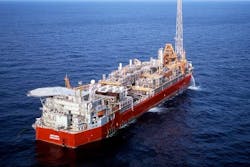Australian Govt to decommission Northern Endeavour FPSO
The Australian government will decommission the Northern Endeavour floating production, storage and offtake vessel (FPSO) and its associated oil fields.
The Minister for Resources, Water and Northern Australia, Keith Pitt, said the government had looked at all options for the vessel and decided that decommissioning and a remedial process will be the most cost-effective way to remove potential risks to the facility and ensure protection of the environment.
The vessel is permanently moored in 400 m of water in production licenses WA-19-L and AC/L5 in the Timor Sea between depleted Laminaria and Corallina oil fields about 550 km northwest of Darwin. It ceased production in 2019. Of double hull design, it was originally installed by a Woodside Petroleum-operated group following discovery of the fields in the mid-1990s. Designed to hold 1.4 million bbl of oil, it processed 170,000 b/d at peak production. The Northern Oil and Gas Australia (NOGA) group of companies bought 100% of the licenses and the FPSO from Woodside in April 2016.
The government has maintained the facility and associated subsea facilities since February 2020 after NOGA was placed in liquidation.
Minister Pitt said the government will now begin the process of decommissioning. The cost of the program remains unclear, but Australian taxpayers will not be left to bear those costs.
“We have been working closely with the offshore oil and gas industry on proposals to recover the costs,” he said.
“The government has been actively working with key stakeholders in the industry to seek advice on reforms to make sure the circumstances surrounding the Northern Endeavour do not happen again. These reforms will take account of the recommendations and findings of the independent review into the administration and liquidation of the NOGA group by offshore regulation expert Steve Walker,” he added.
The FPSO had initially been run with a skeleton crew after production was shut in mid-2019 by order of the Australian National Offshore Petroleum Safety and Environmental Management Authority (NOPSEMA) citing an “immediate threat to health and safety’ due to structural corrosion at the facility.”
NOPSEMA allowed removal of the crew under the vessel’s approved safety case and immediate safety risks had been reduced to zero. The facility has remained unmanned, but in “lighthouse” mode with all navigational aids operating. Field wells were shut in and other controls applied.
The Australian government has opened consultations on a revised policy framework for the offshore oil and gas industries to ensure project developers and operators can safely decommission offshore projects when they come to an end.
Pitt said Australia’s maturing offshore industry is expected to see an increasing number of projects and assets reach the end of their productive lives and move into decommissioning phase during the next 20 years.
Key elements of the enhanced framework to better protect the Australian taxpayer include:
- Increased government scrutiny of title transfers
- Greater assurances that companies can meet their obligations
- The ability of government to recall a previous owner to decommissioning if required.
Consultations of the framework are open until Jan. 22, 2021.
